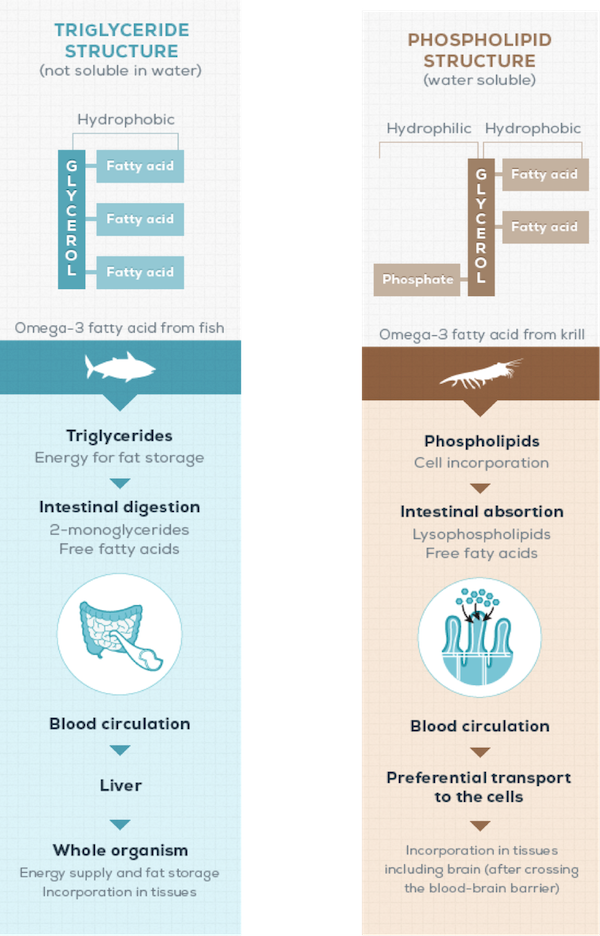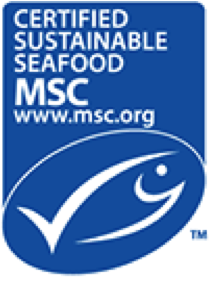Superba™ Krill is extracted exclusively from Euphausia Superba, an Antarctic krill species rich in the omega-3 fatty acids EPA (eicosapentaenoic acid) and DHA (docosahexaenoic acid). A species of zooplankton invertebrates, krill float in huge swarms in Antarctic waters and feed on microscopic algae. Importantly, they represent an essential component of the Antarctic food chain, serving as a food source for a variety of Antarctic marine life, including whales, seals, and penguins. The algae that provide krill’s diet with such a robust source of omega-3s is also the source of the antioxidant astaxanthin, giving Superba™ its distinctive red colour and, more importantly, acting as a natural preservative.
Superba™ Krill omega-3s are transported and integrated into cell membranes quicker and more efficiently because they are bound to phospholipids. As part of cell membranes, the omega-3 fatty acids EPA and DHA have the ability to influence fluidity of the membranes, signalling processes, and metabolic parameters in the cell. In other words, the more omega-3 in your cells, the more flexible they are and the better they function.
Superba™ Krill are not your typical omega-3s. They are unique because they contain phospholipids and astaxanthin, which makes them more bio-efficient and stable. Superba™ Krill also stands out in the world of omega-3s because they are sourced from a pure environment, in a sustainable and traceable manner. At the end of the day, you can be sure you are doing something good for your health and your conscience.
Superba™ Krill is sourced from the pristine waters of the Southern Ocean in Antarctica. Being on the bottom of the food chain, krill are virtually free of contaminants. They also contain Astaxanthin, which preserves their omega-3 fatty acid content. Compared to other sources, krill is one of the most underexploited marine sources of omega-3s on EARTH.
Krill can survive for long periods of time without food and can live as long as 10 years. They also travel in swarms primarily as a defence mechanism to confuse predators that would pick out single krill. These swarms sometimes reach densities that turn the surface of the ocean pinkish-red.
Krill represent the cornerstone of the entire Antarctic food chain—with a biomass of around 500 million tons. Currently, the annual catch of 200,000 tons per year from all krill fisheries (less than 1/3 of 1%) is far below this margin. Coming from the most abundant biomass on earth, Superba Krill will be meeting consumers’ health needs for years to come.
Superba™ Krill is rich in phospholipid omega-3s EPA and DHA, which are more bio-efficient than other marine oils. Phospholipid-bound omega-3 fatty acids are water dispersible, making them gentler on the stomach and more readily absorbed by the body. And with phospholipid omega-3s, less is more—smaller capsules are easy to swallow, easy to digest (no more burps!), and better absorbed by the body.
Phospholipids are natural, integral parts of cells—they are structural components of cell surface membranes and the membranes within the cells. In the case of Superba™ Krill, the majority of the EPA and DHA omega-3s are bound to phospholipids. In contrast, other marine oil omega-3s have EPA and DHA bound to triglycerides, the form of fats the body uses for energy—a form that is also stored as body fat for future energy needs.
The physical characteristics of triglycerides differ from phospholipids and this affects how they are tolerated by the body. One clear difference is that triglycerides don’t disperse and have a tendency to float on top of stomach fluids, which can result in the fishy burps often associated with fish oil supplements. On the other hand, phospholipid omega-3s do disperse in water and are easily blended in the stomach fluids, which is why there is no fishy aftertaste when you take Superba™ Krill.
Superba™ Krill provides omega-3s in phospholipid form, mainly as phosphatidylcholine. Omega-3 availability is increased when delivered by phospholipids compared with other sources, due to more efficient absorption of omega-3 phospholipids in the small intestine. After absorption, phosphatidylcholine is incorporated into cell membranes where it participates in fatty acid transport in blood and across membranes.
Lysophosphatidylcholine is thought to impact the distribution of fatty acids to the body’s organs and tissues because of its role in lipoprotein assemblages, which serve as vehicles that transport fatty acids via blood serum. In certain animal models, after removing phosphatidylcholine from the diet, a significant reduction in the transport of fatty acids to tissues, accompanied by accumulation of fat in the liver, has been observed.
The difference between Triglycerides & Phospholipids

Heart Health
The role of omega-3s in heart health is very complex. From the cellular level to blood vessels, omega-3s represent the link to a healthy heart. The more omega-3s in your diet, studies say, the healthier your heart will be.
Researchers have identified a link between the concentration of omega-3 fatty acids in tissues, blood, and red blood cells, and the overall health of the cardiovascular system. Omega-3s provide recognised benefits in promoting the wellness of the heart and blood vessels, and the evidence supporting greater omega-3 dietary intake is increasing.
Scientists have proposed several different mechanisms by which phospholipid omega-3s promote cardiovascular health. On the sub-cellular level, phospholipid omega-3s are incorporated into cell membranes, alter membrane properties, promote a healthy response to inflammation, are included in modulating enzymes involved in cell signalling pathways, and alter gene expression.
Research shows that omega-3s also support blood pressure and cholesterol levels already within a normal range. They have also been implicated in promoting a regular heart rhythm and supporting normal blood clotting processes. As a result, omega-3s help keeps both the heart and arteries healthy.
Brain health
The brain is the control centre of the human body. It continues to change and grow as we age. Omega-3s are crucial to brain development, as well as health and maintenance throughout the lifecycle.
Only adipose tissue contains more fatty acids than the body’s central nervous system, including the brain. The omega-3 fatty acid DHA (docosahexaenoic acid), which is the most common fatty acid in the human brain, constitutes 15% of all brain fatty acids. Phospholipid omega-3s play key roles in the proper structure and function of brain cell membranes and cell signalling. Conversely, an omega-3 deficiency in brain tissue may affect brain functioning and delay development.
Omega-3s are primarily obtained from the diet. Particularly before birth and during early childhood—periods of rapid brain growth and development—the limited intracellular synthesis of omega-3s in the brain has been shown to be inadequate for sustaining brain health. Throughout life, the amount of omega-3s found in the brain is influenced by dietary intake of fatty acids and by the brain’s developmental stage.
Passage of fatty acids into the brain is restricted—only omega-3s and other essential fatty acids cross the blood-brain barrier. While human breast milk contains relatively small amounts of omega-3s, most are in phospholipid form. Omega-3s bound to phospholipids have been shown to be preferentially transported to brain tissue compared with omega-3s delivered as triglycerides. The proposed mechanism is the presence of carriers that preferentially bind to and carry omega-3s into the brain; thus, phospholipids have been suggested as a superior source of omega-3s for brain tissue.
Omega-3 intake is reported to be valuable in maintaining memory and cognitive functions. In fact, sufficiently high intake of omega-3s has been linked with maintaining and enhancing cognitive function among the elderly. Therefore, adequate consumption of omega-3s is recommended to maintain memory performance and reduce the risk of developing mild memory problems associated with ageing.
The developing brain undergoes particularly rapid growth during the third trimester of fetal life and the first two years of childhood. Insufficiency of certain nutrients can disrupt the complex process of brain development. Omega-3s are crucial for optimal growth and development of the human brain, and an adequate supply is needed from early fetal life. In fact, an association between infants’ omega-3 status and the developmental outcome has been observed.
Not only are omega-3s important for fetal brain development, but research indicates it continues to influence brain function throughout childhood and into adulthood. Low levels of omega-3s in blood and an altered pattern of omega-3s in the brain are observed in children and adolescents who sometimes have trouble concentrating. Some research suggests omega-3 supplementation helps children focus, while positively impacting their behaviour and learning.
Healthy inflammationOmega-3s are anti-inflammatory nutrients that can help balance the body’s level of inflammation and promote health and wellness.
Many consumers live in a state of chronic inflammation, which can increase the risk of many health conditions and diseases. Omega-3s work with the body to bring it back into balance. When the body’s inflammation level is balanced, there is less illness and disease.
Another beneficial effect of omega-3s is that they support a healthy response to inflammation. Increased incorporation of omega-3s into cell membranes results in increased production of omega-3 derived inflammatory mediators. Elevated levels of inflammatory mediators derived from the omega-3s result in weaker inflammatory reactions.
The typical Western diet is very heavy in omega-6 fatty acids due to the overconsumption of processed foods. Omega-3 consumption, on the other hand, is very low by comparison. As a result, the ratio of omega-6 to omega-3 is about 30:1. In an ideal world, the ratio should really be 4:1. Because of this imbalance, most consumers are living in a state of chronic inflammation, which might explain the rise in diseases such as asthma, coronary heart disease, many forms of cancer, and neurodegenerative diseases such as Alzheimer’s. Consequently, this also contributes to arthritis, allergies, obesity, depression, dyslexia, diabetes, hyperactivity, inflammatory disorders and even violent tendencies.
Importantly, research has demonstrated the ability of krill omega-3s to modulate inflammation. Nutrients like omega-3s go right to the cause and bring the body back into balance with regard to the omega-6/omega-3 ratio.
Woman’s health
Omega-3s play a crucial role in women’s lives from birth through adulthood. They have been researched for numerous health benefits, including prenatal, PMS and mood health. Women can rely on krill phospholipid omega-3s from because they are delivered efficiently to target tissues.
PMS (Premenstrual Syndrome) is characterised by a set of hormonal changes that trigger disruptive symptoms in a significant number of women for up to two weeks prior to menstruation. Tests were conducted with the use of krill omega-3 supplementation in order to evaluate whether omega-3 is able to manage PMS.
Studies have shown that phospholipid molecules play an important role in membrane fluidity, which may be the most crucial activity in the management of emotional symptoms. After a treatment period of 3 months, patients noticed a significant improvement in the physical and emotional symptoms of PMS due to the consumption of krill omega-3s.
Omega 3 index
The Omega-3 index is an important indicator of wellness.
An omega-3 index is a diagnostic tool that provides feedback on an individual’s omega-3 status. By recording the percentage concentration of omega-3 in red blood cells, the Omega-3 Index provides a useful indication of a person’s long-term intake of omega-3s.
In one study participants started out with an average Omega-3 Index of 2.0, a relatively low value. After 8 weeks of daily supplementation with 2 grammes of Superba™ Krill, the average index went up to 4.5, an increase of 125%. In fact, an increase of 45% in the Omega-3 Index was seen after just 2 weeks. These observations show that the omega-3s from Superba™ Krill are taken up from the gut to the blood stream and that EPA & DHA are incorporated into cells.
Because the Omega-3 Index reflects the incorporation of omega-3 in cell membranes, which provide numerous health benefits, the Omega-3 Index is suggested to correlate with both the health of the body and its omega-3 status. In other words, an improvement of the ratio of EPA and DHA to other fatty acids in the cell membrane is a strong indicator of a person’s state of health.
SAFETY
Superba™ Krill has an excellent safety record. However, people who have shellfish allergies should not use these products.
Currently, there are no known toxicity levels for krill oil. Antarctic krill live in a naturally clean environment, devoid of pollution, so there’s significantly less risk of heavy metals contamination. Superba™ Krill has undergone extensive in vitro, in vivo and human studies to determine its safety and lack of toxicity.
In a recently published human study with 76 men and women, 4 weeks of krill supplementation increased plasma EPA and DHA and was well tolerated, with no indication of adverse effects on safety parameters. People with known allergies to crustaceans (e.g., shrimp, crab, lobster, etc.) should not use krill products.
SUSTAINABILITY
Superba’s Commitment
We are in constant communication with the appropriate experts and authorities to maintain the sustainable harvest of krill.
Aker BioMarine’s commitment to sustainability runs deep. From its constant communication with the Commission for the Conservation of Antarctic Marine Living Resources (CCAMLR) to its certification program with the Marine Stewardship Council (MSC), the company has made significant investments in people, research, and technology to ensure the future of the krill fishery.
The current annual sustainable harvesting quota is 9% of the total estimated biomass (60 million metric tons) in Area 48 where Aker BioMarine and others are licensed to harvest. However, out of abundant caution, CCAMLR has set an even lower precautionary quota on the annual krill harvest of only 620,000 tons, or 1% of the total estimated biomass in the designated catch area. Krill is one of the largest underexploited stocks in the oceans; the actual current catch in the Southern Ocean is less than 250,000 tons per year—or 0.35% of the biomass. These catch limits are under CCAMLR’s constant supervision and are regularly reassessed and updated if necessary. In actuality, this is one of the most sustainably managed fisheries in the world.
WWF-Norway
 WWF-Norway and Aker BioMarine work together for sustainable management of krill in the Southern Ocean. WWF-Norway commends Aker BioMarine for achieving Marine Stewardship Council (MSC) certification of its krill fishery, and its commitment to assist with further research and advocacy to ensure this fishery is sustainably managed.
WWF-Norway and Aker BioMarine work together for sustainable management of krill in the Southern Ocean. WWF-Norway commends Aker BioMarine for achieving Marine Stewardship Council (MSC) certification of its krill fishery, and its commitment to assist with further research and advocacy to ensure this fishery is sustainably managed.
WWF-Norway is working together with Aker BioMarine to help it meet key MSC certifications requirements, including mapping its fishing activities against local predator populations and ensuring that its fishing operations do not cause serious harm to the ecosystem. Aker further utilises independent observers during all fishing operations and contributes to research by allowing other scientists on the vessel at no cost.
MSC

The Marine Stewardship Council (MSC) certifies Superba™ as being sustainable and 100% traceable from sea to shelf.
Superba™ is the only krill brand certified by the Marine Stewardship Council (MSC), a leader in sustainability standards. MSC requirements meet global best practice guidelines for certification and eco-labeling programs. Its certification is based upon the health of the target biomass and the impact on the ecosystem fishery management system in place.
The MSC is a non-profit organisation whose mission is to help transform the seafood market to a sustainable basis by recognising and rewarding sustainable fishing practices. The MSC maintains a global standard for the certification of sustainable wild capture fisheries and a chain of the custody traceability certification program. The organisation works collaboratively with Aker BioMarine and others in business, fishing, science and conservation to offer buyers and consumers the ability to incentivize and reward sustainable fisheries through their purchasing choices. All products containing Superba™ must be certified by MSC.
CCAMLR

CCAMLR is the regulatory body that oversees the harvest of krill in Antarctica.
Being responsible for the conservation of Antarctic marine ecosystems, the Commission for the Conservation of Antarctic Marine Living Resources (CCAMLR) practices an ecosystem-based management approach. This does not exclude harvesting as long as it is carried out in a sustainable manner and takes into account the effects of fishing on other components of the ecosystem.
CCAMLR is a treaty-based organisation responsible for preserving the resources of the Antarctic. The aim of the Convention is to conserve the marine life of the Southern Ocean. CCAMLR is concerned not only with fisheries regulation; it also strives to implement a holistic approach to the management of marine living resources in the Southern Ocean. CCAMLR has 25 full member nations, and the process of obtaining a license for krill fishing is stringent and restricted.
Aker’s vessels carry an International Scientific Observer during all fishing operations to verify fishing data in accordance with CCAMLR Scheme of International Scientific Observation and Memorandum of Understanding between Norway and the United Kingdom.
CCAMLR very closely monitors the krill fishery. In Aker’s case, we make sure we harvest krill in various parts of area 48, rather than continually taking from the same place. CCAMLR requires krill fishing companies to report back on a weekly basis—Aker reports back to CCAMLR daily. CCAMLR also requires independent observers to be aboard krill fishing vessels 50% of the time—we have independent observers on our vessels 100% of the time.
Eco-Harvesting

Eco-Harvesting® is Aker BioMarine's environmentally friendly krill harvesting technology.
Aker BioMarine developed its patent-pending Eco-Harvesting® technology based on its krill harvesting activity since 2003. This technology, using a specially designed trail system and direct hose connection between the trawl and the vessel, holds a special mechanism that singles out unwanted by-catch (non-krill species) and releases it unharmed.
Harvesting krill in a commercially viable and environmentally sound way is challenging. Traditional trawling methods where the catch is hauled up on deck and emptied into holding tanks before processing is unsuitable, as the krill contains highly digestive enzymes and basically self-destructs before it can be processed.
Aker Eco-Harvesting® fishing system allows the fishing net to stay under water during the entire operation. Independent observers have verified that the proprietary technology and novel harvesting method ensures no by-catch of other species than Euphausia Superba.
The equipment stays under water while a continuous stream of water flows through the hose, bringing the krill life and fresh directly into the factory vessel, which allows for processing of fresh raw material with superior product quality.
Eco-Harvesting® results in minimal environmental impact. The innovative, sustainable krill harvesting will allow future generations to reap bounteous harvests of krill for yet-to-be-developed uses of this tiny but nutrition-packed crustacean.
Antarctic Research
Aker BioMarine maintains its environmental responsibility by conducting various studies on krill, their predators, and the overall ecosystem.
Aker BioMarine actively sponsors research on the health of the krill biomass. In addition to donating the use of its fishing vessel for one week every year for pure research, it collaborates with researchers at the Norwegian Institute of Marine Research, the British Antarctic Survey, and MRAG. We also recently completed a 4-year study on the impact of its fishery on predator species that consume krill. The study was reviewed by the Antarctic Climate and Ecosystems Co-Operative Research Centre and WWF-Norway.
Believing in the importance of sharing best practices, Aker is a co-founder of the Association of Responsible Krill Harvesting Companies (ARK), a global krill industry association developed to promote research for the sustainable harvest of Antarctic krill and to generate scientific data from krill fishing operations in order to facilitate CCAMLR’s management of the krill fishery.
Aker BioMarine has also formed a partnership with Dalhousie University in Halifax, Nova Scotia, Canada to measure the broader environmental performance of products derived from the krill fishery. This research quantified the ecological footprint and life cycle environmental impacts associated with the meal and oil derived from Antarctic krill along with the life cycle environmental impacts associated with Superba™ omega-3 krill capsules. Where possible, parallel analyses of similar products were undertaken to provide a basis for comparison.
Traceability
Superba™ is the only KRILL ingredient certified by MSC as being 100% traceable from sea to shelf.
Aker BioMarine is a vertically integrated company within the krill harvesting and processing industry. Our custom built vessel processes krill meal immediately after the kill is onboard. The impressive infrastructure set up on the vessel ensures continuous delivery of the meal to port in South America. From there it is transported to other regions for further processing or sale around the world.
Being able to trust that your krill supplements come from a sustainable source is crucial, which is why Aker has adopted The Marine Stewardship Council’s (MSC) “boat to plate” mentality. It delivers on this by adhering to MSC’s Chain of Custody standard. In other words, when you buy a product that carries the MSC eco-label, every company that has handled the product, from the fishery to the manufacturer, has been independently audited to ensure it only uses the MSC eco-label on certified sustainable products, stores MSC-certified items separately, and keeps effective records of MSC-certified products.
The comprehensive traceability element of the MSC program is important because it ensures that MSC-labeled products are sourced from a fishery that is MSC certified, and it protects buyers and the fishery from fraudulent labelling and risks from fisheries carrying products from illegal, unregulated and unreported (IUU) fishing. As a result, the integrity of the sustainability claim is ensured and the MSC-certified fishery of origin receives proper credit.
In the end, MSC’s traceability certification provides assurance to commercial buyers and consumers that MSC-certified products can be traced through the supply chain back to their origin—a sustainable fishery.
Controlled value chain
Aker BioMarine maintains full control over the production of Superba™, from harvest to processing to encapsulation.
Aker BioMarine’s fishing operations are conducted with full transparency, giving stakeholders confidence that the business is well-managed. This drive toward transparency is the foundation of Aker’s guarantee of 100% traceability of Superba™ Krill from sea to shelf. By controlling the entire supply chain, from harvesting krill, processing raw materials, logistics, final processing, product specifications and internal and external audits, Aker BioMarine is able to guarantee the highest level of quality and quality assurance of Superba™ Krill products. Part of that guarantee revolves around traceability, which is becoming increasingly important in today’s market. As a result of this integrated activity, Aker has the ability to trace all end-products back to the exact location of harvest through its sophisticated GPS system aboard each vessel.
Consuming clean Omega 3’s
PURE KRILL – NOTHING MORE, NOTHING LESS
Superba™ Krill is unique in the marine omega-3 world due to the significantly fewer processing steps needed to create the final product. Relative to other marine omega-3 sources, krill is considered a whole food extract. In fact, because it is environmentally clean in its original form, no purification or distillation is required. Furthermore, the immediate on-board processing of Superba™ Krill prevents decomposition and degradation and protects the nutritional integrity of the product.
Krill was evaluated in an independent study and found to contain virtually no contaminants in comparison with another marine omega 3 products. The size of the dot represents a number of products tested. We feel krill represents one of the cleanest sources of marine omega-3s on the market today.
What does Superba™ Krill contain?
Each capsule of Superba™ Krill contains 500 mg of pure Antarctic krill, which is rich in omega-3 fatty acids, phospholipids, and the antioxidant astaxanthin.
What are omega-3 fatty acids?
Omega-3 fatty acids are long-chain, polyunsaturated fatty acids that play an important role in many processes in the human body. They are also essential fatty acids because our bodies do not synthesise them; omega-3 fatty acids must be obtained through diet.
How long have people been harvesting krill?
Krill has been harvested since the 1800s in the waters around the Southern Ocean and Japan. Large-scale commercial harvesting got underway in the 1960s and early 1970s.